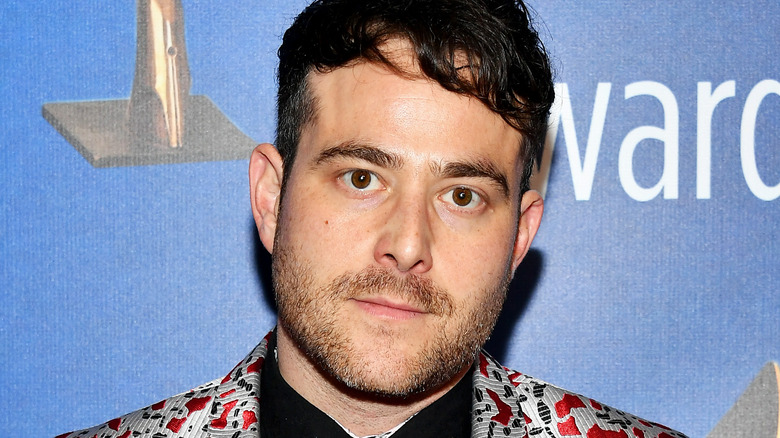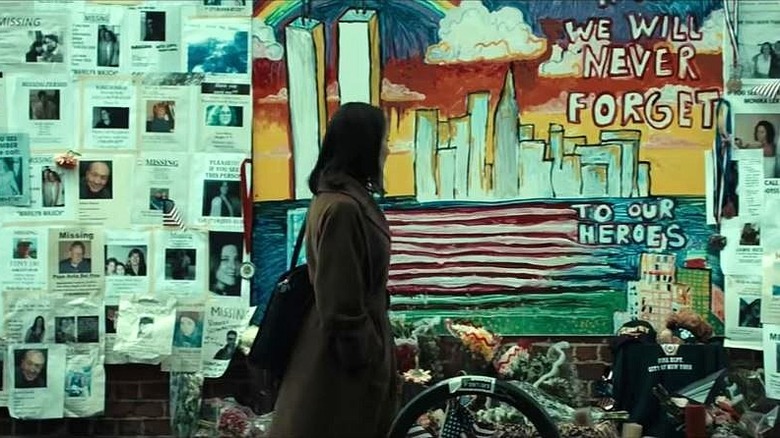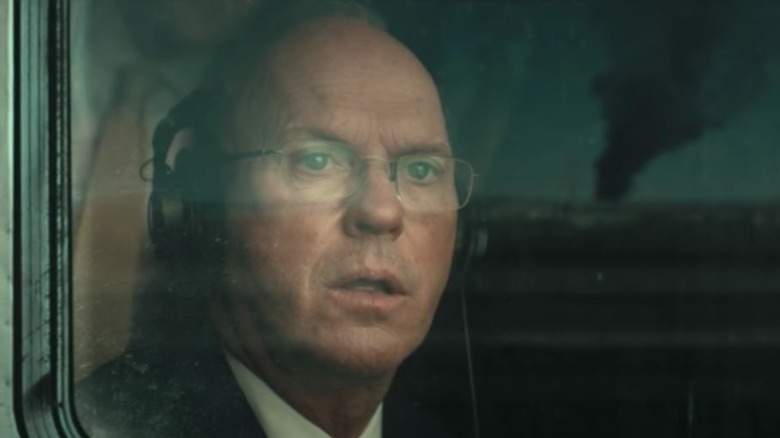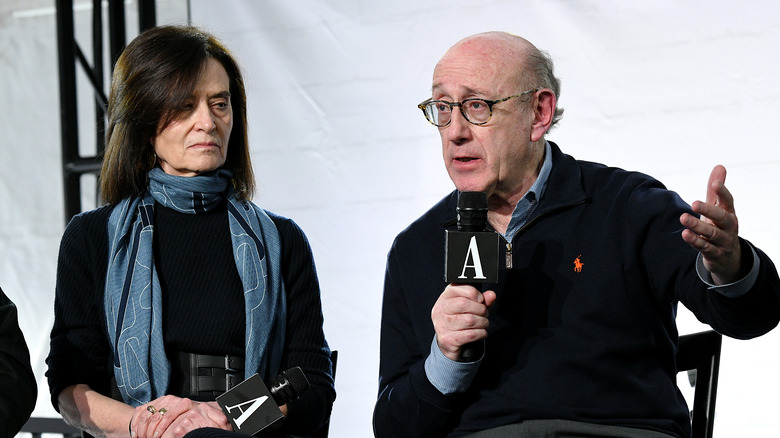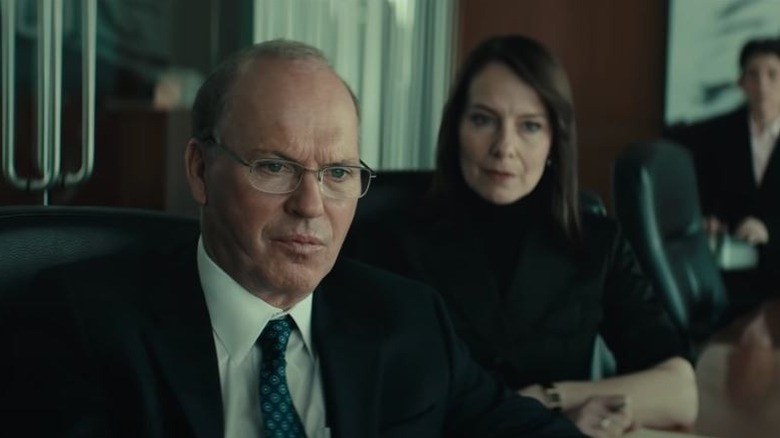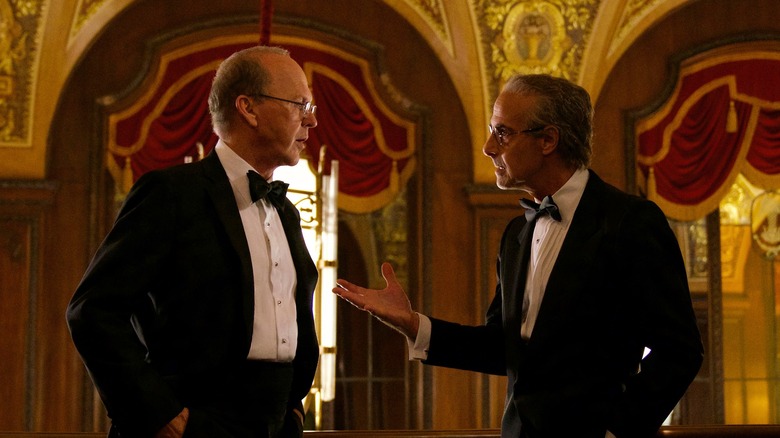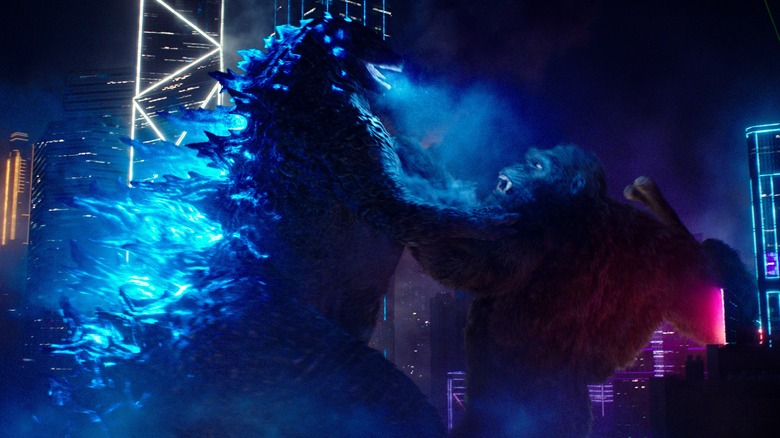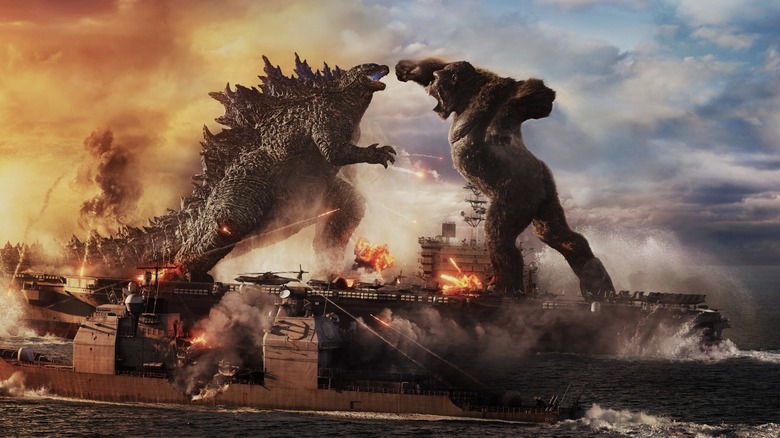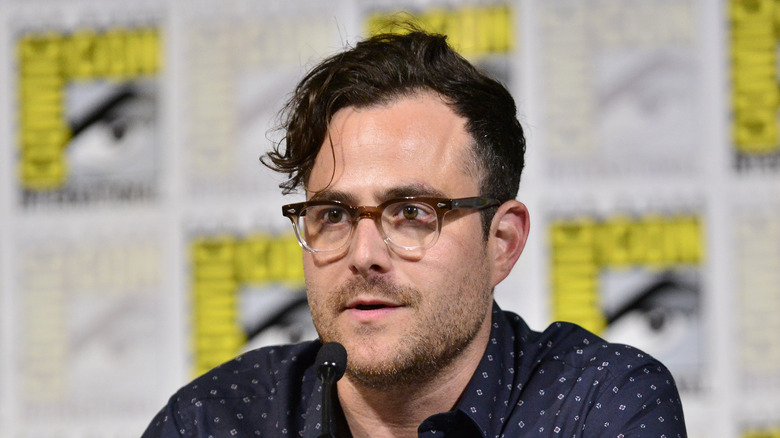Worth Screenwriter Max Borenstein Details The Heartbreak Behind The Fact-Based 9/11 Drama - Exclusive Interview
While writing a script for any film genre is never an easy task, acclaimed screenwriter Max Borenstein was faced with something far more daunting when penning his new film "Worth." Rooted in one of the most horrific events in American history — the September 11, 2001, terrorist attacks — "Worth" explores the traumatizing aftermath of 9/11 as a mediation team strived to justly compensate thousands of victims of the tragedy.
Now on Netflix, "Worth" stars Michael Keaton as real-life attorney Kenneth Feinberg, who was appointed Special Master of the September 11th Victim Compensation Fund by the U.S. government. Together with his law partner Camille Biros (Amy Ryan) and their firm, Feinberg worked pro bono for nearly three years to find a way to honor the memories of the victims and soothe the heartache of the survivors. "Worth" chronicles the multiple roadblocks Feinberg and Biros faced as they worked to find a way to administer the funds, including government bureaucracy, politics, and pushback from those who felt some of the lives lost were worth more monetarily than others.
Based on Feinberg's 2006 bestselling book "What Is Life Worth?: The Inside Story of the 9/11 Fund and Its Effort To Compensate the Victims of September 11th," Borenstein's script for "Worth" has been in development for years, and made the 2008 Black List of the movie industry's hottest un-produced screenplays. Directed by Sara Colangelo, "Worth" also stars Stanley Tucci as Charles Wolf, a community organizer who lost his wife on 9/11 and disputed Feinberg's formula for the compensation fund.
In an exclusive interview with Looper, Borenstein discussed the long and difficult path of making "Worth," as well as his work with Feinberg, Biros, and Keaton. Then, shifting to much lighter topics, he talked about his hand in creating the MonsterVerse with the "Godzilla" and "Kong" movies, and his upcoming untitled L.A. Lakers series.
Worth's focus
I'm sure it's a question you hear often, but what are your personal recollections of September 11, 2001, and how did those recollections find their way into the writing process of this film?
I was fortunate not to have lost anyone personally, but I had been there the weekend before. My grandmother and my aunt lived downtown, and I was visiting from school. A friend of mine and I walked around in the Plaza and then the next week it happened. It was early morning, and like everyone, I remember exactly where I was. I remember running back to my dorm room and waking up all my roommates so they could watch the TV because I had seen it and just sprinted back. I think it's one of those events that is seared in our memory, largely because everything in our lives changed forever. It's a lot like the Kennedy assassination was for another generation — one of those things that the event itself was dramatic and tragic, but beyond that, it just reshaped the way we as Americans, and I think citizens of the world, kind of conceive our place in it.
All of that, obviously, I think was a profound motivator for me, for all the people involved in the film, we kind of felt like it was an important story to tell. But this particular facet of the story is one that I am the most familiar with. I think it really focuses less on the tragedy itself and more on the human cost and on the redemption, or at least the sort of healing process from something like that where it's never fixed, but there is a grief process.
In this case, Ken Feinberg and Camille Biros and their team were thrust by this sort of law the administration was well into being at the center of this whirlwind of grief and the practicalities and the mess of it. And they were asked to administer law ... and that proved an enormous challenge for Ken and Camille. It's a challenge I think is a relatable kind of thing for everyone who lived through that, because we all wanted to do our part to lend a hand to help in the aftermath of that event. I think so few of us had an opportunity to really do much. Feinberg and Biros did, and it was an extraordinary challenge.
Not a 9/11 story, but one about the traumatic aftermath
So many of us lived through that day and had seen the footage of the worst of what was happening with the Twin Towers, and in the film, you get the horror of what happened by seeing the look on Ken Feinberg's face through the stunned reaction of Michael Keaton. You didn't include actual footage of the towers falling — was that a conscious decision because you didn't want to further traumatize people?
Yeah. Well, I think we've all seen it. Like you say, we all lived through it. And so, in different ways, some more than others, but we're all well aware that this is not a story about 9/11. You know there are no bad guys in this story. The bad guys came before this story. They were the people who were behind the attacks. This isn't a story about the attacks. This is a story about what happens after, and what happened when the government, in its efforts to try to safeguard the economy, had to somehow deal with all of the individuals who were ... These lives had been torn apart. And how did they do that? How could they do that with compassion and empathy on an individual level when it was something on such a large scale?
That's the challenge that Ken and Camille were presented with. And it's one that I think it would be distracting to relive the event itself. We all know that. And so, from a dramatic standpoint, we all carry our own memories in, and it serves the film in a certain way, where the film doesn't have to try. If anything, we have to kind of be sensitive about not overdoing it for some melodramatic reasons. It's important. We can let that real emotion resonate for people. And we can tell a story that starts afterward.
Borenstein says Feinberg and Biros are still affected by the tragic stories they heard
It's reasonable to assume that you interviewed Ken Feinberg, Camille Biros, and Priya Khundi from Feinberg's firm for the film. Can you still see the hurt in their eyes? The way that first meeting was portrayed with the survivors — that's something that could traumatize somebody for a lifetime. Did you sense that from them that this is something that they carry with them?
Oh, definitely. I spoke at length and still do with Ken and Camille. Priya is a composite character of a few different younger associates that worked with them. But yes, it's palpable and tangible how much they were impacted. Ken is an opera lover and a music lover. And the only thing that got him through the experience of being a sponge and listening and absorbing all these people's stories every day was going to the opera at night, oftentimes just to fall asleep. But at least it was something that was beautiful and that could distract him for moments from the horror that he was witnessing secondhand. I think he was someone who would tell you that going in, he was less accustomed to or facile at dealing with people in an emotional moment. He had less bedside manner.
Camille, I think, had a stronger sense of it right away, just personality-wise. But it was extraordinarily difficult and taxing on both of them. Of course, not nearly as taxing as it was on the actual victims, but having to be in a position of being a functionary whose job it was to get the people to persuade them to come aboard this fund and not sue the airlines and so forth. And to tell them the government wants to give you money for your loved one, but they're not giving you the same amount, depending on how much your loved one earned, that was something they were forced to do — it was extraordinarily difficult and frustrating at times.
Michael Keaton's determination to do the story justice
Michael Keaton is such a brilliant actor. I recall that going all the way back to "Night Shift," where how he showed such tremendous range, both as a comedic and a dramatic actor. Were you still surprised at all by the depth and soul he gave Ken Feinberg?
God, he's just one of the great actors of his era of our country. He is amazing and I've always been an enormous fan. Michael was the guy that we had in mind to play Ken. I talked to him about the project years ago, before he'd kind of settled on the idea that he wanted to do it. He was anxious about it, I think because he was very intrigued by it, by the character, by the story. At the same time, he was intimidated, I think, by the demands of telling the story and doing justice to it. He wanted to be respectful to the two and also sensitive to the facts, while creating something that was dramatic and compelling. We had a long conversation early on and then it stuck with him and then eventually he agreed to do it.
I thought what Michael brought to the role was gorgeous because it wasn't a caricature of Ken. Ken's a very specific guy with a very larger than life personality in real life. And I think Michael was able to bring something to him that was nuanced and specific without feeling like a caricature. I marveled at what he did every day.
You mentioned that Ken would go to the opera to, in a way, let go, to take the edge off of things. Obviously, given the seriousness of "Worth," did you lighten things up by telling Michael, "Hey man, you know what? I'm a huge Batman fan"?
[Laughs] We mentioned it once or twice.
That must be a weird situation going into a project. Again, as serious as this one is, where you have this affinity for this guy who did this iconic role as Batman.
Yeah. He will always be my favorite Batman and now he's doing it again, which is exciting.
He didn't give you any intel on that, did he?
Oh, no. I don't know anything specific, I just know it's happening. [Laughs]
Then and now
Obviously, at some point you need to finish the script and proceed with the project, and I'm sure there were factors after filming was finished where you said, "I wish I'd done this differently." But the way Afghanistan is unfolding, do you look at things differently now than you did when you were conceiving or making the project?
Oh, I don't know. Not really. Not from now to then. I think the film taught me a lot. Diving into research on the film taught me a lot, but I don't think my politics made me ask the question.
I'm not asking about it in a political way — more from the standpoint of the way the operation imploded at the end, which has some people are asking, "What were we there for? What was the point?"
I think when I look at the film in that sense, one thing that attracted me to it through the beginning was that back in whatever it was, 2007, when I sort of first wrote it, we were in the middle of these wars, and everything had become extremely sort of politicized. And 9/11 was something that had stopped being a national tragedy shared by all. And had become, I think, used by both sides — but by one side more than another — as a political football, as something that was a sort of rally around the flag. I think with the idea that people were martyred and that therefore a political agenda was going to be undertaken maybe for the best of reasons, maybe not. But regardless, it felt like in the aftermath of 9/11, the immediate aftermath, we had a situation where the country came together, and the world came together.
I was abroad shortly after. And I remember vividly being in a London pub and people coming up to me and hearing my American accent, and just giving me hugs and buying me pints ... it was a feeling in the sense that empathy crossed borders. And it's amazing to remember that moment, because in the immediate aftermath of that moment, all of that potential energy, so much of it was squandered politically on different wars and different agendas that felt like they used 9/11 as an excuse, but had very little to do, it turned out — with Iraq, for example — with the actual event. And so, one wonders and there's arguments to be had, but was it simply just the next political excuse? But lost in all that was the actual tragedy and lost even more was that moment when it had nothing to do with politics.
Also, it was simply a matter of everyone feeling like a New Yorker. Everyone around the world felt sympathy, empathy, and love in the aftermath of something awful. And that's something beautiful to remember and something I think that was tragically lost. However, in this particular case, I think of the 9/11 fund. It's an example of not a perfect thing, but a moment where and a way in which that potential energy of the tragedy was captured and at least put toward something positive and well-intended, rather than squandered or manipulated or used for ulterior motives. And I think that's something really heartening to remember.
Entering the MonsterVerse
We're huge fans of the MonsterVerse, and since you're one of the architects of the franchise, I hope you don't mind some questions about it. Godzilla and King Kong movies haven't always been what people were hoping they'd be. What sort of different spins, creatively, do you think helped propel your "Godzilla" and "Kong" movies, especially with the latest one, "Godzilla vs Kong"?
It's funny, because the script that became "Worth" years ago was the sample that got me the job writing "Godzilla," weirdly, and there's been four movies since then. It took us all that time to get "Worth" on its feet, but not being a monster movie, it's harder to get made. I think we approached each of those films in a way a little bit equally where I worked closely with each director. Each of the films kind of represents kind of a different tonal interpretation of that material. "Godzilla" is a lot more grounded, partly because it did it closer to that moment and it's something that's kind of dark and has this sort of grounded quality where it feels like, "What if it's really happened?" And then I think each of the subsequent movies has its own sort of tonal spin. It's been fun to use that franchise as an opportunity to explore different interpretations, and different, fun ways of using that material to sort of comment on things and give your cultural spin on a war movie or different kinds of stories.
Godzilla vs. Kong
I hate to ask people to play favorites, but I'm a Kong guy, okay? I just love Kong. So, I'm going to put you on the spot: Godzilla or Kong, who's your favorite?
Oh, that's impossible for me. I'm a parent!
You don't want to pick your favorite kids, that's for sure.
But I know it's like they just have their own sets of challenges. Kong was easier certainly because he's got an anthropomorphic side to him. Godzilla was more mysterious. I love them both.
Despite the pandemic hampering the box office, I would say the enthusiastic turnout for "Godzilla vs. Kong" showed there is still a huge appetite for these characters. Which directions would you like to see the franchise go?
Great question. I think [production company] Legendary has had a tremendous handle on it. They always pick great directors and I've been fortunate to be involved in some way in each of these, and I'll pick up the phone if it rings again. I think we tend to lead with the director and just what's inspiring and then kind of go from there. I think there's something really refreshing about that
You don't have any idea of where you want things to go?
I do have some ideas, but I'm not going to share them right now because you have to keep some to yourself. [Laughs]
Okay, hear me out. The same studio has Godzilla, Kong, and Michael Keaton as Batman. How about a "Godzilla vs. Kong vs. Batman"? How about that?
Hey, I'm down. I'd love to write that. [Laughs]
Mining for gold
Are there any other franchises that you'd like to get involved in? I see you have a "Game of Thrones" project in your future as well.
I don't have any that are specific that I have to be involved in, but I think for me, when there's an opportunity like that, it's always about, "What can you bring to it that's something fresh and new and is there still some gold in the mine?" And that's more really a personal question when you're approaching it. "What is it? What do I think in that moment I might be able to tackle from this project and this story and this IP?" And so, I look forward and hope that some of the more interesting things come my way.
I had the opportunity to talk with Edwin Hodge when "The Tomorrow War" came out, and of course Edwin plays Ron Boone in your upcoming Lakers series.
Fantastic!
With the full cast in place and filming underway, what can you share with me about the series?
Oh, it's going to be great. We're still shooting now and it's coming along. It's probably slightly premature for me to share too many details, but we had an incredible cast and there's no better network than HBO, so we're really making something special that we're excited for people to see.
"Worth" is streaming exclusively on Netflix.
